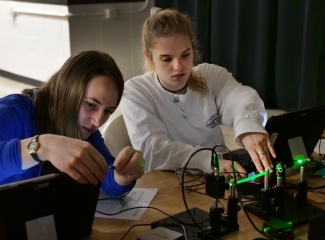We transformed our introductory physics lab course to better prepare students for future courses and careers. We began by soliciting input from a variety of university stakeholders including faculty and staff from both physics and the College of Engineering and Applied Science. The consensus learning goals are listed below.
(1) Students’ epistemology of experimental physics should align with the expert view.
(1a) Alternative Definition: Student’s beliefs about the nature of experimental physics should align with expert physicists. This includes understanding that physics is an experimental science, what makes for a valid measurement, and how knowledge is gained through experiments.
(2) Students should have a positive attitude about the course.
(3) Students should have a positive attitude about experimental physics.
(4) Students should be able to make a presentation quality graph showing a model and data.
(5) Students should demonstrate a set-like reasoning when evaluating measurements.
(5a) Alternative Definition: Students should understand that a measurement has an associated uncertainty and is not the “true” value. They should understand that repeated measurements form a distribution with a mean and a standard deviation.
The course is designed around four three-week modules: Experimental Skills, Mechanics, E&M and Optics. Students work on guided inquiry labs in pairs. They record their predictions, data, analysis, and outcomes using an electronic lab notebook (OneNote) on a tablet provided for them in the lab.
Labs
- Skills 1: Exploratorium using lab notebooks
- Skills 2: Solar cell powered motor: graphing
- Skills 3: Wind energy and statistical uncertainty
- Mechanics 1: Tennis ball launcher: 1D projectile motion
- Mechanics 2: Tennis ball launcher: 2D projectile motion
- Mechanics 2: Tissue Toughness
- E&M 1: Parallel plate capacitor with a dialectic material
- E&M 2: Capacitive Sensor
- E&M 3: LED color mixing
- Optics 1: Laser light refraction
- Optics 2: Fiber optics
Course Materials
Instructors who would like to get access to the related course materials for this course should email lewandoh@colorado.edu.



 The Physics Frontiers Centers (PFC) program supports university-based centers and institutes where the collective efforts of a larger group of individuals can enable transformational advances in the most promising research areas. The program is designed to foster major breakthroughs at the intellectual frontiers of physics by providing needed resources such as combinations of talents, skills, disciplines, and/or specialized infrastructure, not usually available to individual investigators or small groups, in an environment in which the collective efforts of the larger group can be shown to be seminal to promoting significant progress in the science and the education of students. PFCs also include creative, substantive activities aimed at enhancing education, broadening participation of traditionally underrepresented groups, and outreach to the scientific community and general public.
The Physics Frontiers Centers (PFC) program supports university-based centers and institutes where the collective efforts of a larger group of individuals can enable transformational advances in the most promising research areas. The program is designed to foster major breakthroughs at the intellectual frontiers of physics by providing needed resources such as combinations of talents, skills, disciplines, and/or specialized infrastructure, not usually available to individual investigators or small groups, in an environment in which the collective efforts of the larger group can be shown to be seminal to promoting significant progress in the science and the education of students. PFCs also include creative, substantive activities aimed at enhancing education, broadening participation of traditionally underrepresented groups, and outreach to the scientific community and general public.